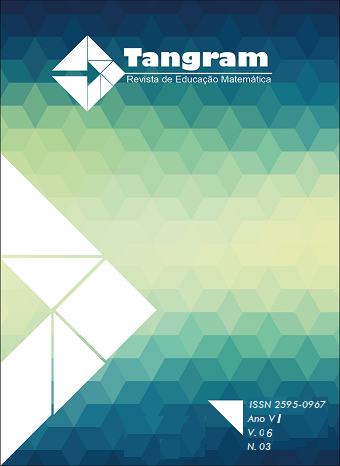Abra un ejercicio para crear posibilidades para explorar temas transversales en las clases de Matemáticas
DOI:
https://doi.org/10.30612/tangram.v6i3.17387Palabras clave:
Temas Transversales. Educación Matemática Crítica. Leer y escribir en el mundo.Resumen
Este artículo es un extracto de una tesis de maestría que exploró temas transversales en la Educación Matemática. Para esta sección, exploramos el potencial de tres preguntas de Matemáticas para enseñar contenido en esta disciplina, mientras exploramos críticamente temas transversales. La investigación, de carácter cualitativo, utilizó las discusiones en Educación Matemática Crítica como referencia para el análisis. Los participantes del estudio fueron profesores de Matemáticas que, en su mayoría, tienen poca experiencia en el aula. Los análisis revelan que una acción del profesor que hace que las preguntas sean potencialmente poderosas para explorar los temas transversales es la acción de “abrir” el ejercicio, que invita al estudiante a investigar y, a partir de esa investigación, leer y escribir el mundo.
Descargas
Citas
Alrø, H., & Skovsmose, O. (2010). Diálogo e aprendizagem em Educação Matemática. 2. ed. Belo Horizonte: Autêntica. (Tendências em Educação Matemática)
Araujo, U. (1997). Apresentação à edição brasileira. In BUSQUETS, M. D. et al. Temas Transversais em educação: bases para uma formação integral (pp. 9-17). São Paulo: Ática, 1997.
Carvalho, J. S. (2017). Uma concepção de cidadania (planetária) para a formação cidadã. Inter-Ação, 42(1), 105-121.
Cezar, M. dos S. (2022). Empoderamento docente e educação Matemática crítica: em busca de uma prática educativa libertadora nos anos iniciais do ensino fundamental. 2022. 258 f. Tese de Doutorado, Curso de Programa de Pós graduaçãoMultiunidades em Ensino de Ciências e Matemática, Universidade Estadual de Campinas, Campinas.
Freire, P. (1979). Conscientização: teoria e prática da libertação. São Paulo: Cortez.
Fiorentini, D. (2003). Em busca de novos caminhos e de novos olhares na formação de professores de Matemática. In D. Fiorentini (org), Formação de professores de Matemática: explorando novos caminhos com outros olhares (pp. 7-16). Campinas: Mercado de Letras.
Gavídia, V. (2002). A construção do conceito de transversalidade. In M. N. Álvarez et al. Valores e Temas Transversais no currículo (pp. 15-30). Porto Alegre: Artmed.
Gutstein, E. (2003). Teaching and learning mathematics for social justice in an urban, Latino school. Journal for Research in Mathematics Education, 34(37-73).
Gutstein, E. (2017). Eric Gutstein e a leitura e escrita do mundo com a matemática. Entrevistador: Moura, A. Q. & Faustino, A. C. Revista Paranaense de Educação Matemática, 6(12), 10-17.
Jesus, R. V. de, & Torisu, E. M. (2022, abr.). Um estudo dimensional das representações sociais sobre a matemática de um grupo de estudantes do Ensino Médio. Perspectivas da Educação Matemática, 15(37), 1-15.
Milani, R. (2020). Transformar exercícios em cenários para investigação: uma possibilidade de inserção na Educação Matemática Crítica. Perspectivas da Educação Matemática, 13(31), 1-18.
Ministério de Educação e Cultura (1998). Secretaria de Educação. Parâmetros curriculares nacionais: primeiro e segundo ciclos do ensino fundamental: matemática. Brasília: Autor.
Ministério de Educação e Cultura (2019). Secretaria de Educação Básica. Temas Contemporâneos transversais na BNCC: contexto histórico e pressupostos pedagógicos. Brasília: Autor.
Penteado, M. G. (2004). Redes de trabalho: expansão das possibilidades da informática na Educação Matemática da escola básica. In M. A. Bicudo, & M. C. Borba (orgs.), Educação Matemática: pesquisa em movimento (pp. 283-295). São Paulo: Cortez.
Powell, A. B. (2017). A educação Matemática crítica na visão de Arthur Powell. Entrevistador: Torisu, E. Revista Paranaense de Educação Matemática, 6(11), 7-17.
Prestini, S. A. M. M. (2005). Transversalidade e Temas Transversais na formação inicial do professor de matemática. Dissertação de Mestrado. Curso de Programa de Pós-Graduação em Educação, Universidade Federal do Paraná, Curitiba.
Skovsmose, O. (2000). Cenários para investigação. Bolema, 13(14), 66-91.
Skovsmose, O. (2008). Desafios da reflexão em Educação Matemática Crítica. Campinas: Papirus.
Skovsmose, O. et al. (2009). Antes de dividir temos que somar:“entre-vistando” foregrounds de estudantes. Bolema, 22(34), 237-62.
Skovsmose, O. et al. (2012). A aprendizagem matemática em uma posição de fronteira: foregrounds e intencionalidade de estudantes de uma favela brasileira. Bolema, 26, 231-60.
Skovsmose, O. (2014). Um convite à educação matemática crítica (O. de A, Figueiredo, Trad.). Campinas: Papirus.
Skovsmose, O. (2017). O que poderia significar a educação matemática crítica para diferentes grupos de estudantes? Revista Paranaense de Educação Matemática, 6(12), 18-37.
Zabala, A. (2002). Enfoque globalizador e pensamento complexo: uma proposta para o currículo escolar. Porto Alegre: ArtMed.
Descargas
Publicado
Cómo citar
Número
Sección
Licencia

Esta obra está bajo una licencia internacional Creative Commons Reconocimiento-NoComercial-CompartirIgual 3.0.
Os autores devem aceitar as normas de publicação ao submeterem a revista, bem como, concordam com os seguintes termos:
(a) O Conselho Editorial se reserva ao direito de efetuar, nos originais, alterações da Língua portuguesa para se manter o padrão culto da língua, respeitando, porém, o estilo dos autores.
(b) Autores mantém os direitos autorais e concedem à revista o direito de primeira publicação, com o trabalho simultaneamente licenciado sob a Atribuição-NãoComercial-CompartilhaIgual 3.0 Brasil (CC BY-NC-SA 3.0 BR) que permite: Compartilhar — copiar e redistribuir o material em qualquer suporte ou formato e Adaptar — remixar, transformar, e criar a partir do material. A CC BY-NC-SA 3.0 BR considera os termos seguintes:
- Atribuição — Você deve dar o crédito apropriado, prover um link para a licença e indicar se mudanças foram feitas. Você deve fazê-lo em qualquer circunstância razoável, mas de nenhuma maneira que sugira que o licenciante apoia você ou o seu uso.
- NãoComercial — Você não pode usar o material para fins comerciais.
- CompartilhaIgual — Se você remixar, transformar, ou criar a partir do material, tem de distribuir as suas contribuições sob a mesma licença que o original.
- Sem restrições adicionais — Você não pode aplicar termos jurídicos ou medidas de caráter tecnológico que restrinjam legalmente outros de fazerem algo que a licença permita.






